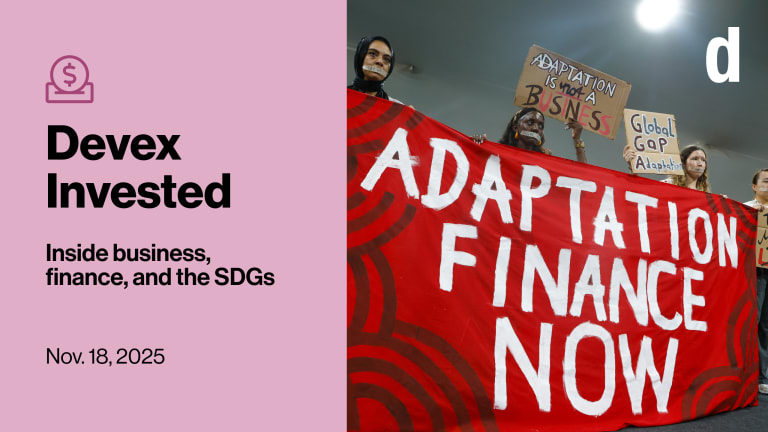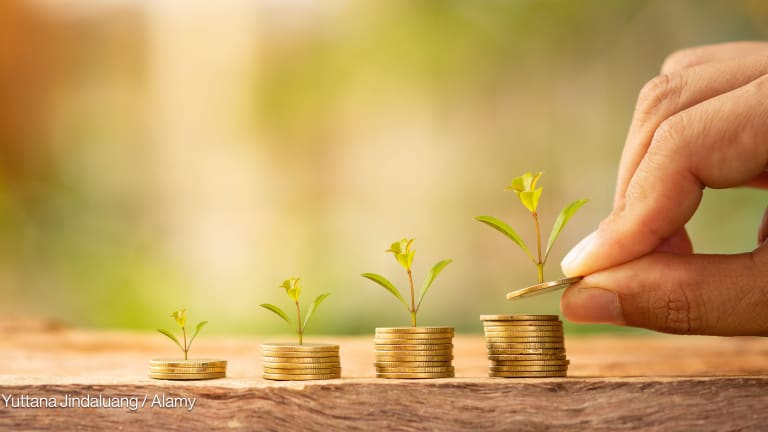
What should we expect in the year ahead for development finance? One of my sources put it this way: “I think this is the year people say, ‘Enough with the bullshit.’”
That means more disclosure around companies’ social and environmental impact and how ESG is defined; more accountability; a bigger push from the private sector on financing development-related issues; and continued growth in tools such as bonds and guarantees. It’s a year in which private investors and companies will be pushed to live up to commitments — with many focusing on financing a transition to net-zero greenhouse gas emissions.
This is a preview of Devex Invested
Sign up to this weekly newsletter inside business, finance, and the SDGs, in your inbox every Tuesday.
As commercial capital shows more interest in global development issues, this year will also bring questions for development finance institutions about how and where they invest, as well as an increased focus on their additionality.
Here are a few issues to watch:
• Net-zero. There seems to be general agreement that this year will see momentum around financing a transition to net-zero emissions and operationalizing existing commitments.
• ESG and climate disclosure. If you read last week’s newsletter, this won’t come as a surprise. But with the new International Sustainability Standards Board — which aims to create comprehensive sustainability-related disclosure standards — and more government regulations expected, it’s worth tracking how these efforts play out and whether they bring transparency and clarity to the ESG space in particular.
• Accountability. This goes hand in hand with disclosure. But a lot of companies have been making big commitments, especially related to achieving net-zero, and they’ll be under pressure to back them up. As the Global Impact Investing Network’s Amit Bouri put it, there could be “a big shift from pledges to a focus on performance.” But big companies won’t be the only ones under the microscope. Amid greater private sector attention, DFIs will also face more scrutiny and tension around their role, Allianz Global Investors’ Nadia Nikolova tells me.
• Instruments of choice. 2022 appears teed up to be another strong year of growth in the green, social, and sustainability bond market. Guarantees — either to support bonds oriented around the Sustainable Development Goals or to help de-risk other investments — will be important, I am told. And while blended finance took a hit as a result of the pandemic, it is expected to recover this year. We’ll see if it can meet some of the demands from the private sector to unlock additional capital.
Devex Pro: Development finance trends to watch in 2022
ICYMI: 5 trends shaping global development in 2022
EIB goes global
The European Investment Bank has officially launched its new development branch.
At a press conference in Brussels last week, my colleague Vince Chadwick asked EIB President Werner Hoyer whether it should focus not only on impact but greater volumes — to which Hoyer responded that there was a need for a “considerable leap” in investments outside the EU.
“I can very well imagine that if we can show that EIB Global is a very effective tool, then this can be scaled up,” Hoyer said, adding that he wanted to keep a “low profile” on that prospect to avoid scaring EU national leaders and finance ministers.
Read: EIB boss pushes for more investments outside EU
Background reading for Pro: EIB’s expanding presence in Africa
+ Devex tracks EIB’s investments, tenders, and contracts in Africa, and a Pro subscription gets you the most out of our coverage on it. Not yet on Pro? You can try it for free for 15 days.
Zeroing in
The U.N.-convened Net-Zero Asset Owner Alliance has expanded its target-setting protocols to go beyond 2025 and include additional sectors and asset classes. The goal is to encourage organizations committed to the longer-term net-zero goal to be more ambitious in the short run. So far, 30 of the 69 alliance members have set targets for 2025.
Your next job?
P5 Inclusive Growth and SDG Finance Advisor
United Nations Development Programme
South Africa
Günther Thallinger, the chairman of Allianz’s ESG board and a key player in the alliance, said that “on the path to 2030, alliance members will be required to reduce portfolio emissions within a range of 49% to 65%.” More broadly, the new protocols call for asset managers to “commit their entire portfolios to 1.5°C degree alignment” — referring to the target cap for global warming — “and net-zero by 2050.”
The alliance, whose members have a combined $10.4 trillion in assets under management, says it hopes for more action from DFIs, including on blended finance. One upside to this approach, according to a spokesperson, is that blended finance could make it possible for asset owners with fiduciary responsibilities to invest in emerging-market climate solutions.
Join us
It’s almost time for Prescription for Progress, our annual event focused on global health technology and innovation. This year, I’m especially looking forward to hearing from Vinod Khosla, the founder of Khosla Ventures, about where he sees health tech heading.
Register now for the Feb. 15 event.
Investments of interest
• Husk Power Systems, a clean energy company, signed a U.N. energy compact and is now planning to build 500 solar minigrids in Nigeria in the next five years. The commitment is significant because the financial viability of minigrids has often been questioned, even as they have been touted as a key piece of energy access.
• The Impact Investment Exchange listed a $30 million Women’s Livelihood Bond for Climate on a Singapore stock exchange. It’s only the fourth gender lens bond to be publicly listed.
• TLcom announced a first close of $70 million for a $150 million African tech fund, setting it up to become the biggest independent venture capital firm dedicated to the continent. Investors are a veritable who’s who of DFIs, including DEG Impact, CDC Group, IFC, Proparco, and Swedfund. But it wasn’t all DFIs; Allianz also invested.
What we’re reading
Can companies force themselves to do good? [The New Yorker]
McKinsey issues new report on the costs of a net-zero transition. [McKinsey & Company]
Investing in public markets to finance the SDGs. [Convergence]
A look at whether EBRD is living up to its pro-democracy mandate. [Financial Times]
Shabtai Gold contributed to this edition.









